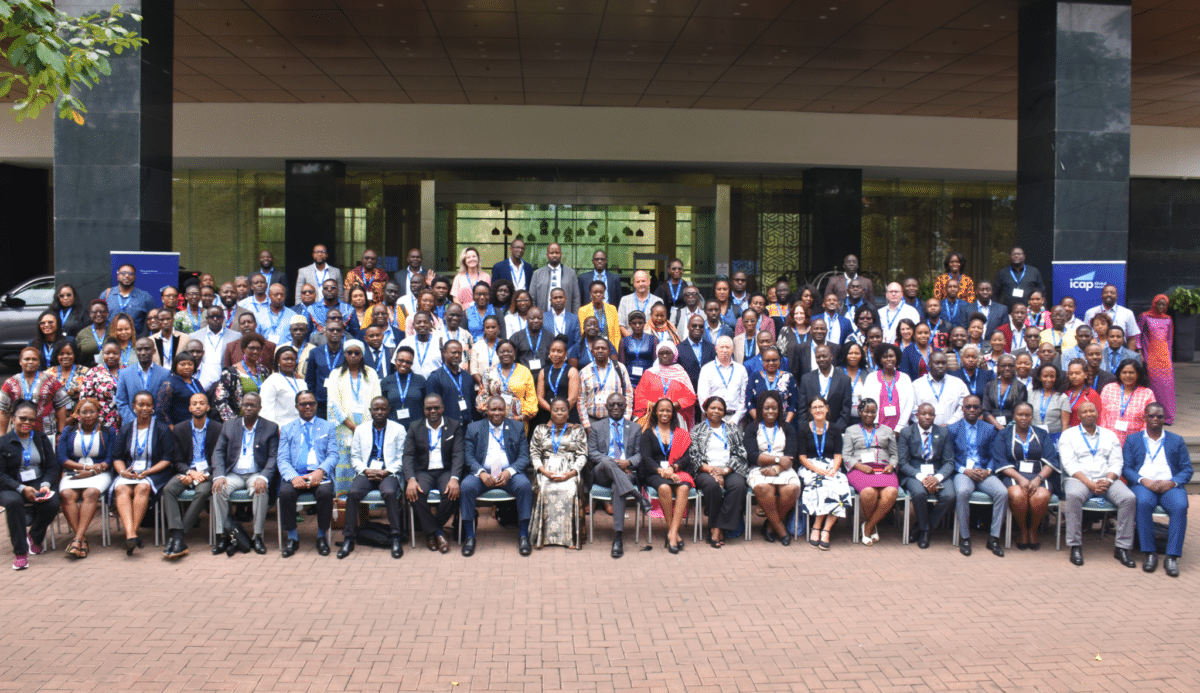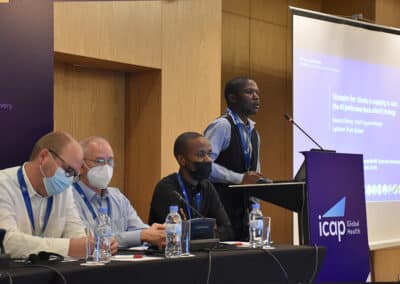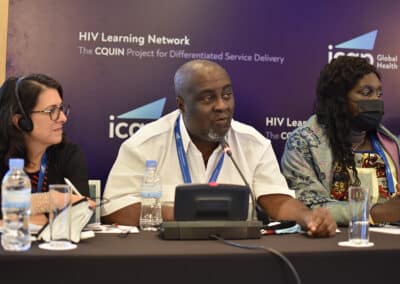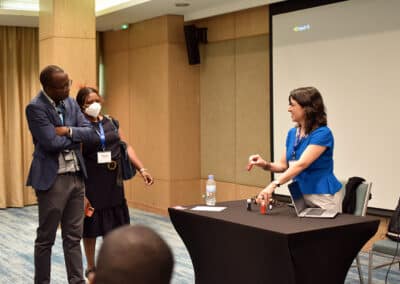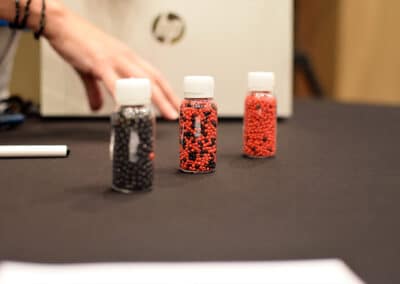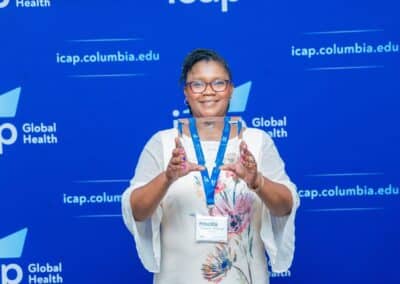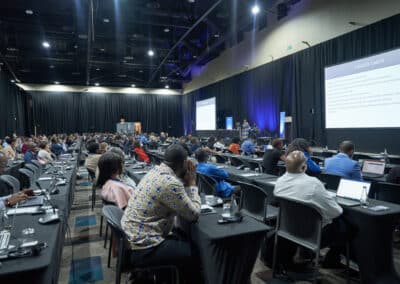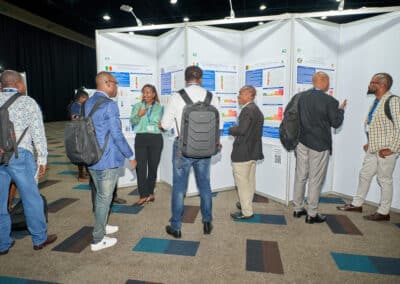Challenges with linkage, retention, and re-engagement in care were center stage at CQUIN’s Differentiated Service Delivery (DSD) Across the HIV Cascade meeting held in Kigali, Rwanda, from August 15 to 19, 2022.
CQUIN convened over 200 participants, including ministry of health representatives from network member countries, national networks of people living with HIV, implementing partners and other stakeholders, to foster discussions on how DSD can optimize person-centered service delivery to enhance sustained and successful engagement of recipients of care in HIV treatment services.
“A study from Zambia highlighted the complex and dynamic interplay of personal, social, health system, and structural-level factors that influence patient disengagement from ART care,” said Peter Preko, MBChB, MPH, CQUIN project director. “We need to strive for client-centered interventions that include friendly working hours and better provider-recipient of care dialogue while being particularly mindful of how we treat people struggling with adherence and retention,” Dr. Preko said.
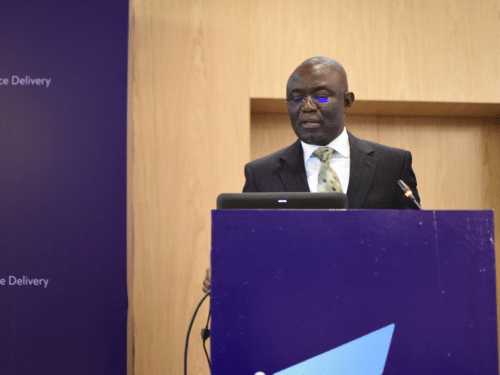
Peter Preko, CQUIN Project Director, speaking about the goals of the “Cascade” meeting on the opening night
Participants shared case studies, research, and innovations for robust country-to-country learning in plenary, country breakout, and parallel sessions.
“This has been a great collaborative, innovative learning experience, working with communities to enhance linkage, retention, and return to care for clients,” said Jonah Onentiah, MD, HIV Treatment Services manager with Kenya’s National AIDS and STI Control Program.
Highlights
In a session exploring linkage case studies, Chinyerem Immanuel, MD, MSc, Care, and Treatment lead for ICAP in Nigeria, shared lessons learned from targeted community-based strategies and innovations to overcome health systems barriers to testing and linkage in a state with the highest HIV prevalence in Nigeria. In her presentation, she outlined how the RISE project implemented a client-centered approach to ART initiation informed by client preferences, HIV disease stage, and contexts such as distance to health facilities and other patient socio-economic factors.
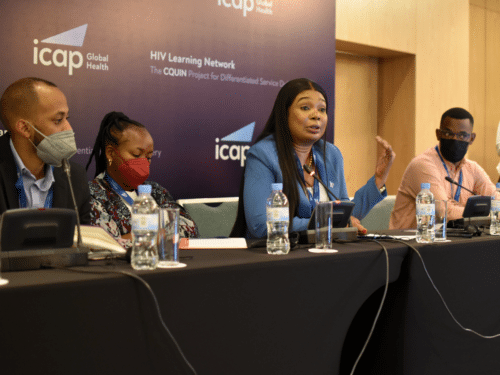
Dr. Immanuel answering questions from participants after her presentation
—
In a session on retention, Kombatende Sikombe, BSc, MPH, research manager at the Center for Infectious Disease Research in Zambia (CIDRZ), presented outcomes from a study exploring the drivers of recipient of care engagement and disengagement (the BetterInfo study). The study shows structural, clinical, and psychosocial reasons for client disengagement.
In that same session, Elsie Ayeh, president of the Ghana National Network of People Living with HIV, presented a personal experience case study on the challenges of community engagement in care. “We have to focus on community system strengthening when it comes to retention, including dealing with stigma, mental health, and psychosocial issues,” she said.

Panel on retention case studies
—
In a session on re-engagement, Boniface Chione, MPH, chief programs manager at Lighthouse Trust in Malawi, presented a case study showing how his organization focuses on health worker advocacy to welcome clients back to care. Lighthouse’s “4D approach” entails health care workers deflating recipient of care fears of returning to care, discussing reasons for treatment interruption, directing the client to appropriate services, and decorating (rewarding) the client to continue treatment.
Nicholas Vako, executive director of the National Network of People Living with HIV in Côte d’Ivoire, gave a presentation on the role of religious leaders in engaging recipients of care. “We must make the engagement of religious leaders a major topic of discussion at one of these meetings,” he said, citing the sidelining of faith, which is one of the significant influences on health choices in Africa.
—
In a parallel session, participants had a choice between discussions on Supporting Linkage, Retention, and Re-engagement for Pregnant and Breastfeeding Women, Client Satisfaction and the HIV Cascade, and Monitoring and Evaluation throughout the Cascade.
“This meeting has sensitized us to untapped resources and opportunities in our DSD experience as a low HIV prevalence country. As a result, we are highly motivated to adopt key strategies such as the PAMA concept of DSD for PMTCT from Kenya,” said Stephen Ayisi-Addo. The “Papa /Mama concept” PAMA is a DSD model tailored for parents and their children to prevent mother-to-child transmission of HIV in Kenya.
In addition, country teams got an in-depth explanation and demonstration of DSD tools and resources from 10 teams in a Tools Lab. There were presentations ranging from CQUIN’s Differentiated HIV Testing Services Self-Staging Toolkit to the use of B-OK bead bottles – colored beads in bottles that explain viral load suppression.
The culmination of the meeting was the development of country action plans to improve linkage, re-engagement, and retention strategies. Six countries presented their goals on the final day of the meeting after three days of discussions and deliberations. “We want to hold the Ministry of Health accountable for optimally implementing the agreed strategies for differentiated linkage, retention, and re-engaging our recipients of care. We also expect you to hold recipients of care accountable to doing our part to support the cause. That’s what meaningful community involvement and engagement requires of us all,” said Anele Yawa, general secretary for South Africa’s Treatment Action Campaign.
-
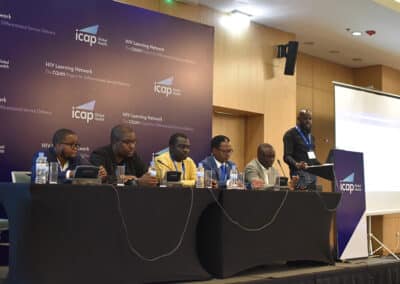
Country action plans presentation panel
-
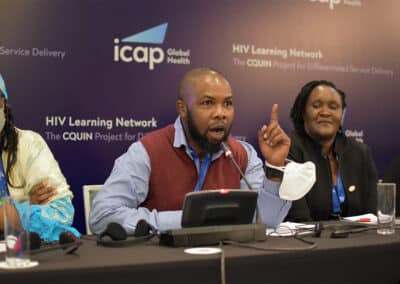
Anele Yawa, calling on meeting stakeholders to commit to action plans developed at the meeting
Access all resources, including slide presentations, tools lab resources, and photos, on the meeting page here.


